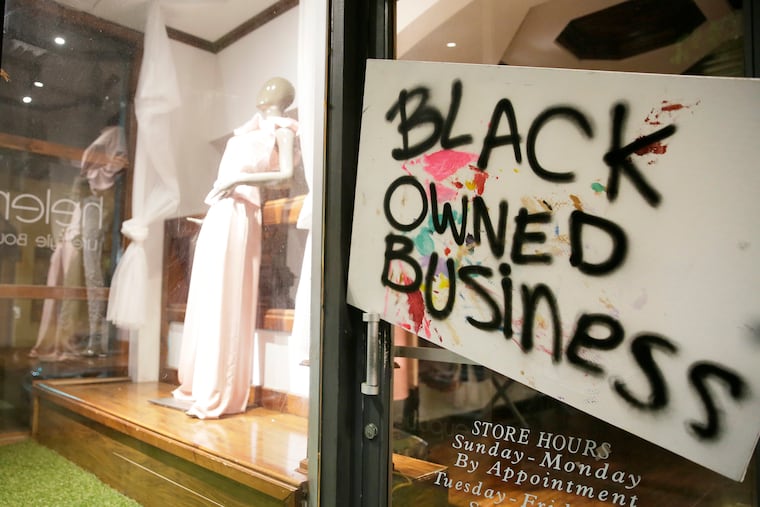The Black community needs better internet access now | Opinion
The business community must be at the table to get every family in our region enrolled in the Affordable Connectivity Program.

Last November, President Joe Biden signed a $1 trillion bipartisan infrastructure bill into law. The bill provides $42 billion for wiring underserved communities and creates a $14.2 billion Affordable Connectivity Fund to provide a $30 monthly discount to qualifying low-income households.
These resources can help Pennsylvania’s Black community recover from problems that predated the pandemic but were exacerbated by intersecting medical and economic crises. Just as interstate highways of the last century separated Black communities from jobs and business opportunities, the digital transformation of our economy comes with different forms of racial, ethnic, and economic inequalities.
In order to close this digital divide, we need not only to build new networks in rural America but also to get more of our unconnected neighbors connected to the fast networks already in place in our cities and suburbs.
Broadband internet is essential for economic opportunity and mobility, but adoption rates remain unequal. Recent reports from Pew Research Center show that while 77% of all Americans subscribe to broadband at home, only 65% of Latinos, 71% of African Americans, and 44% of low-income households have access to high-speed internet.
As the president and CEO of the African American Chamber of Commerce of Pennsylvania, New Jersey and Delaware, I have seen how the pandemic’s economic impact has fallen hardest on communities of color. To ensure our recovery reverses these losses, leaders in both the public and private sectors need to focus on empowering small businesses and helping workers develop the in-demand skills they need to climb the economic ladder. Achieving these goals depends on another urgent objective: universal broadband connectivity. Pennsylvania needs to get everyone online, including low-income communities of color, so that we can all share more equally in this engine of economic empowerment.
Broadband connectivity is the ticket to full participation in the 21st-century economy. During the pandemic, education, training, health care, marketing, and access to government programs all have moved online. In the early days of the pandemic, Philadelphia instituted virtual service delivery of probate and marriage licenses.
As the nation moves to a hybrid “new normal” that melds in-person and online communications, broadband access will only become more essential for Pennsylvanians as they work to gain skills and credentials, get and keep good jobs, and found and build businesses.
In our state’s major cities and suburbs, broadband is widely available, yet many still don’t connect. According to area summaries from the Federal Communications Commission, nearly 99.4% of households in Philadelphia have broadband service readily available. These connections are world-class. Yet a 2021 Household Internet Assessment Survey conducted by Wilco Electronic Systems shows that only 84% of Philadelphia households are connected to high-speed internet.
There is cause for hope — the percentage of Philadelphians with at-home broadband has increased significantly since the start of the pandemic — but a lot more work needs to be done.
Neighboring communities have similar stories to tell. Pennsylvania’s Chester County, Delaware’s New Castle County, and New Jersey’s Camden County all benefit from broadband that reaches 99% or more of homes, but at least one in six households across these counties is still not signed up for service. President Biden’s bipartisan infrastructure bill should turbocharge efforts to close this gap.
Thanks to an idea championed by civil rights organizations like the NAACP and the National Urban League, the bill’s Affordable Connectivity Program will subsidize subscriptions by offering up to $30 a month off of home broadband service for households earning less than 200% of the poverty level — that’s more than one in four households in Pennsylvania.
But some of our unconnected neighbors may still be reluctant to subscribe to home broadband services, for reasons that are all too familiar to those of us who have promoted vaccinations, voter registration, and other civic participation campaigns. The data about broadband adoption confirm what community leaders already understand: Distrust of large institutions, language barriers, and poor digital skills combine to discourage eligible families from signing up. According to a 2021 national study from Pew Research Center, 71% of unconnected adults say they just aren’t interested in having high-speed internet at home.
This skepticism and hesitancy hold back opportunity and growth in Philadelphia and the broader metro region. Unconnected adults are cut off from online job training and skills development resources — at a time when businesses across the country have millions of unfilled openings. Unconnected children will struggle to develop the digital fluency they’ll need to succeed as our next generation of entrepreneurs.
That’s why the business community must be at the table — alongside local officials, schools, and grassroots organizations — to develop a concrete plan to get every eligible family in our region enrolled in the Affordable Connectivity Program.
When we help people understand why and how to go online, the social and economic benefits will be boundless. With broadband connectivity and digital literacy, energetic and ambitious people will be better able to gain skills and credentials, apply for new and better jobs, start and grow businesses, access private capital and government grants and loans, and market their products and services to a wider audience.
Entrepreneurs need digital tools to be successful. That is why we must bring broadband to all of our neighbors.
Regina A. Hairston is president and CEO of the African American Chamber of Commerce of Pennsylvania, New Jersey and Delaware.